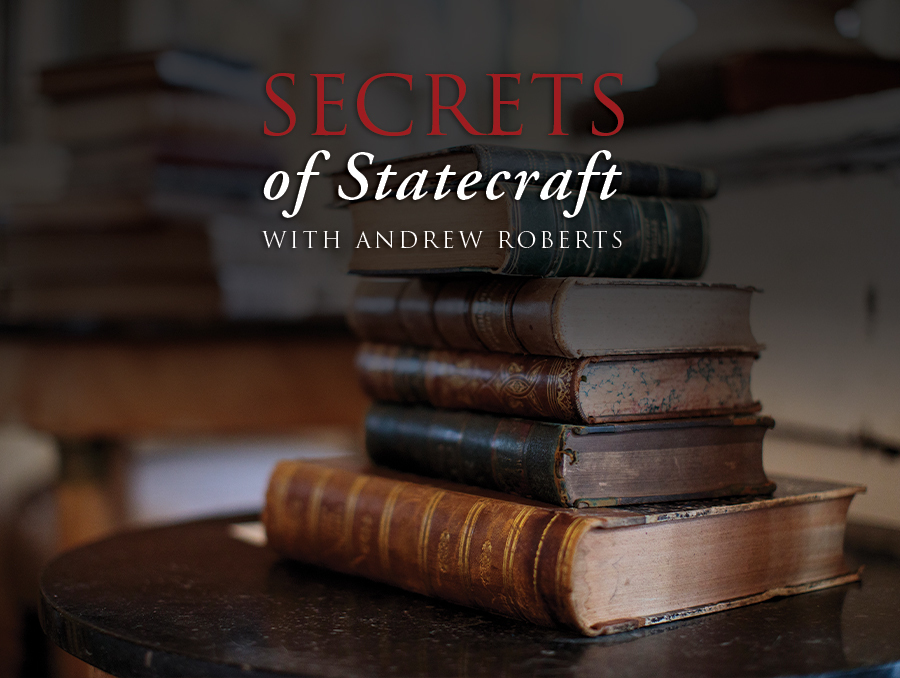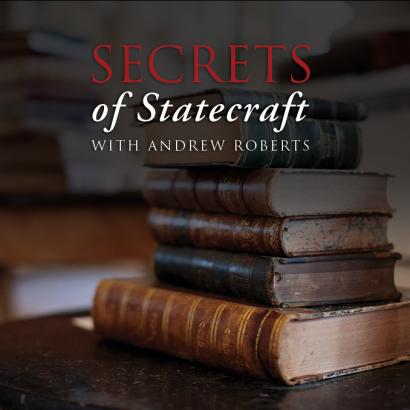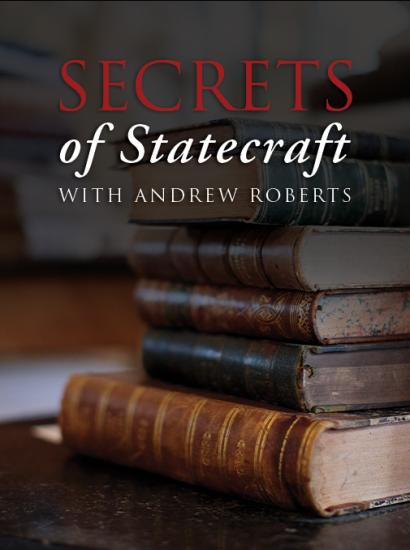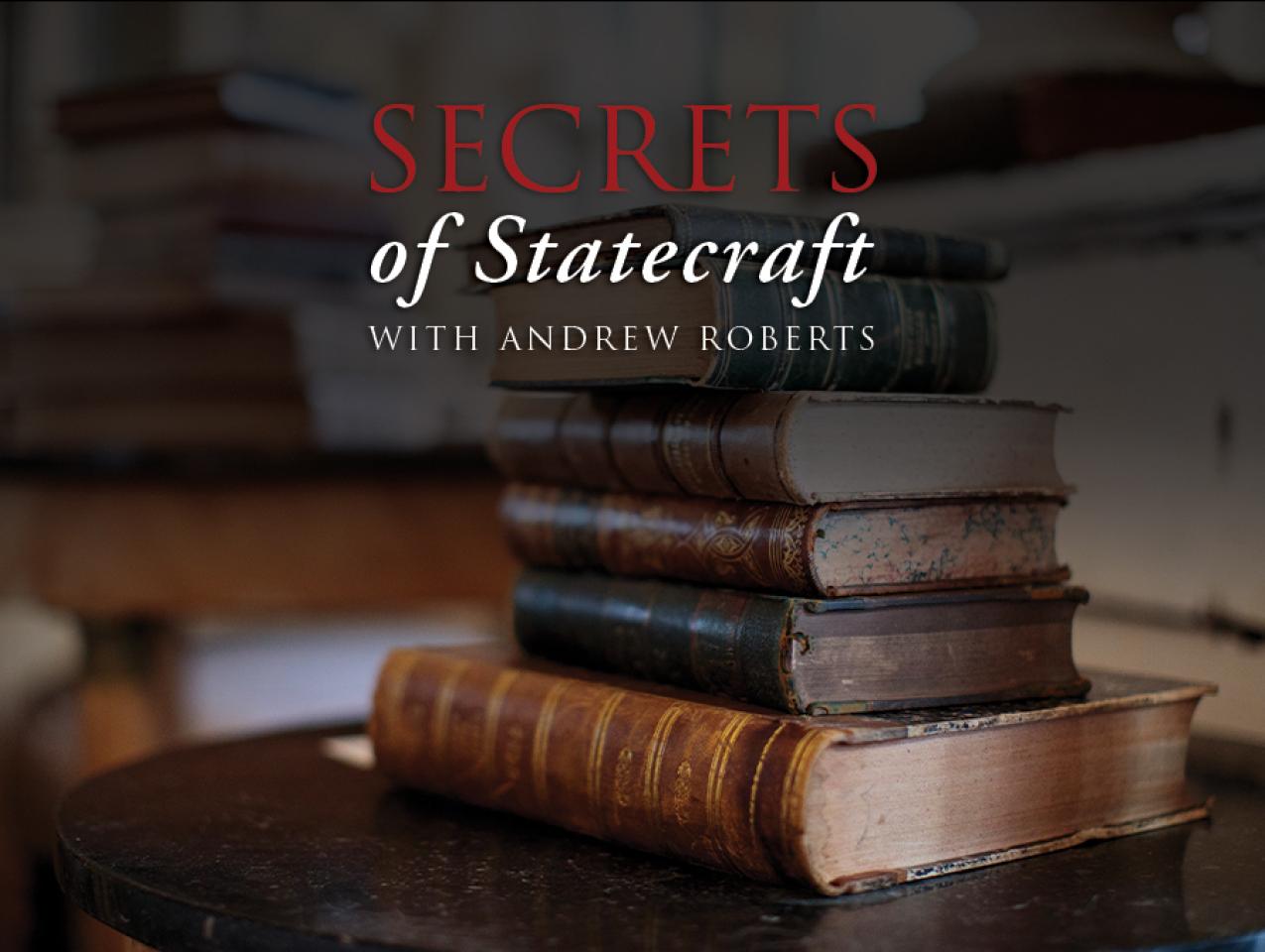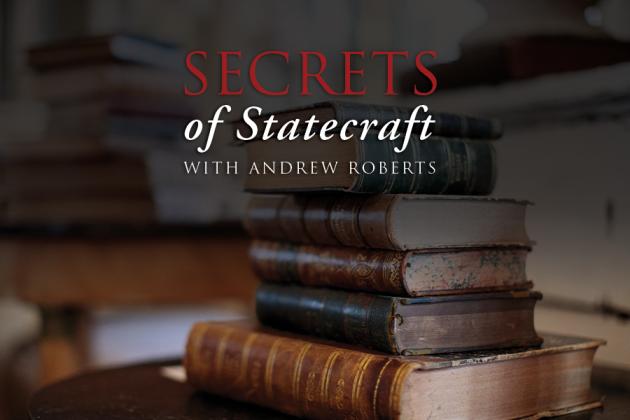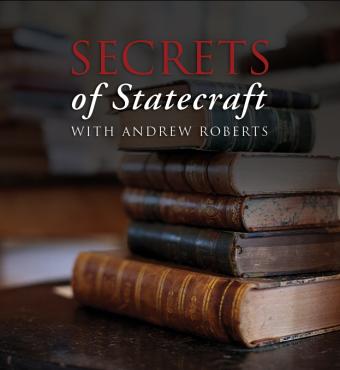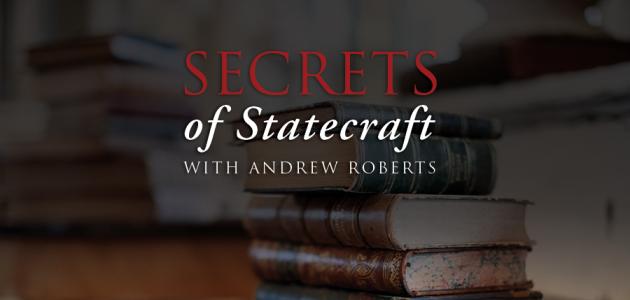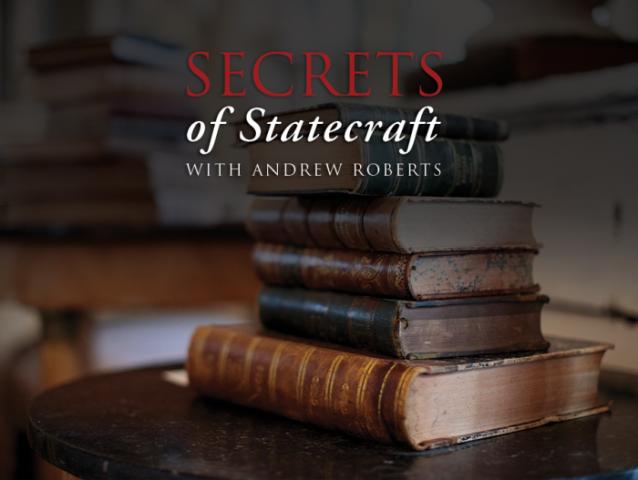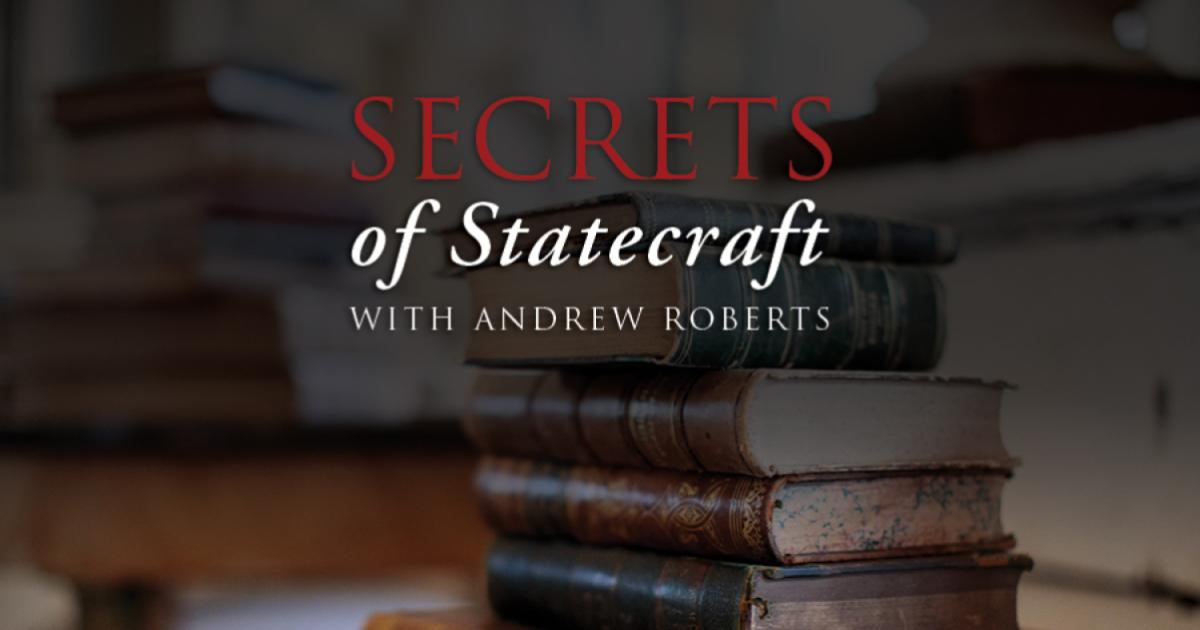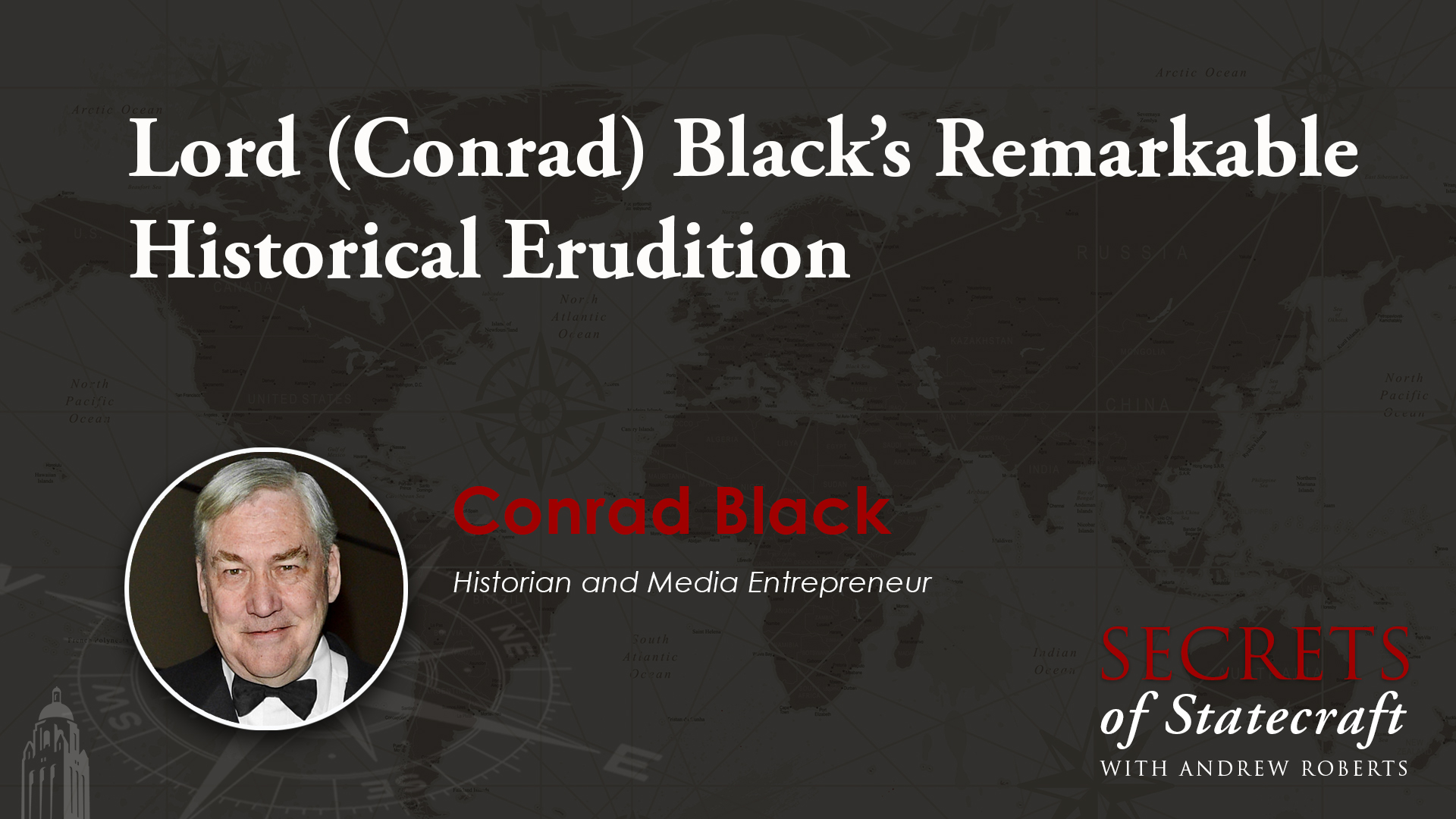- History
- Revitalizing History
The Canadian businessman and peer Conrad Black has published the second volume of his political and strategic history of the world, from 14AD to 1648, and it’s a corker.
WATCH THE VIDEO
>> Andrew Roberts: Lord Conrad Black of Cross Harbor is the author of the Political and Strategic History of the World, Volume 2, from the Caesars to the Peace of Westphalia and Louis XIV. It's AD 14 to 1661. Conrad, many congratulations on the Political and Strategic History of the World, Volume 2.
Which takes us from the Caesars, from the death of Augustus in AD 14, all the way up to the Peace of Westphalia and Louis XIV, 1600 plus years later. And you've done it somehow in 1200 pages. What an achievement. Congratulations.
>> Conrad Black: I try and make it as condensed as I can, but balance, manage.
Well, you know all about this, Andrew, more than I do. You balance manageable length against reasonable reading ability. Just hope it comes out right.
>> Andrew Roberts: Well, it has in this case, in your volume. It certainly has. Plus great jokes, by the way. My favorite one. My favorite joke was when you were talking about Elizabeth first sending off somebody called Peregrine Bertie.
That's how you say, Peregrine Bertie, a justly improbable name for someone sent in any mission of conquest on the continent of Europe. But. But there's what I like.
>> Conrad Black: When some British internecine dispute somebody was his passage from London to another center, Oxford or something. His security was entrusted to so and so who defined his security as delivering his head and body separately to the detonation.
>> Andrew Roberts: Yeah, that's a very good one. All right, look, let's go through it. Not necessarily chronologically, but just as thoughts come to me. Was there such a thing as the Dark Ages, or is that a misnomer?
>> Conrad Black: Not really, in the sense that I, as a young person sort of conceived of it as just a period of a couple of centuries where everything was bad.
I would say no, but there were certainly dark periods. And of course, they particularly had to do with disasters like plagues and terrible fires and things like that, famines. As you know, Andrew, they didn't know how to manage the food supply properly. And there were these terrible wars that went on.
And what shocked me most was the casualties in some of these wars. I mean, the 30 Years War was. It was a terrible war. Now, I always admired Richly, and it worked well for him. He bribed the Swedes to do the dirty work. But I always admired the fact that when he died, the Pope said.
As you know, popes are generally assumed be fairly unconditional in their views about the existence of the divine intelligence. He said, if there is God, the cardinal will have a great deal to answer for. If not, he was a very Great man.
>> Andrew Roberts: Well, he is a great man from this book, isn't he?
And specifically, what you like about him and what I've worked out, reading this book that you like about a lot of people is his two things. The fact that he's cunning and perceptive again and again your heroes and heroines in this book are people who are cunning and perceptive.
Do you know that? Have you worked that out about yourself?
>> Conrad Black: Style and high intellect. Richelieu did, he took his position as the founder of the French Academy very seriously. That's always the decoration he had around his neck. Not a religious one and. Or a secular one, governmental.
And he was the provost of the Sorbonne throughout his time as chief minister, and he took that very seriously, too. He was an authentic scholar and he had great style. He made popular the scarlet outfit and so on. Yeah, he had great panache. I've always felt the caricature of him by Duma and the Three Musketeers was an outrage.
I mean, he was a scoundrel in some ways, but he was a very distinguished man.
>> Andrew Roberts: Let's stick on the cunning aspect, because you also say, or in fact, you don't say, but you quote Henry III of France saying that Elizabeth I of England was the most cunning woman in the world.
And you admire her caution on occasion, but under ability to say something to the Spanish and something completely different to her own people, especially her own privateers. There's a cunningness there as well that's part of her greatness.
>> Conrad Black: You and I, Andrew, have, all the time I've known you, have shared, amongst many other views, our admiration for her.
It's surely one of the great ironies of British history that Henry viii, one of his confected grievances against Anne Boleyn was that she didn't produce male heir. But the heir she did produce was the greatest monarch in British history and arguably in European history.
>> Andrew Roberts: Yes, no, absolutely.
I certainly think that. Although you say there's considerable skepticism about her being the Virgin Queen. This is a pretty outrageous slur, isn't it, for you.
>> Conrad Black: Riding in cavalier fashion.
>> Andrew Roberts: I am, I'm the Sir Walter raleigh of the. 21St century as regards,
>> Conrad Black: With a happier fate, I hope.
But he used to say, all right, I'll defer to you in this. We're all those liaisons you had that they never really, as we used to say, university went the distance.
>> Andrew Roberts: They didn't go the distance. These guys all were hoping that they would and they were. She loved all the incredibly handsome people, but the idea of Elizabeth's, the first actually sleeping with.
Dudley and Lester and these people.
>> Conrad Black: And of course, the state of Virginia was paid homage to that alleged condition. No, but look, you know British history better than I do. But is it, is it pretty much agreed by Elizabethan scholars that. That she was a virgin?
>> Andrew Roberts: Yes.
And Somerset, for example, where.
>> Conrad Black: Well, was there ever any medical attestation to that when she died or anything?
>> Andrew Roberts: No, no, no, they certainly didn't check the, the corpse, the hyman of Elizabeth Gloriana. Absolutely. Than talk about her great enemy, Philip of Spain, because there you call him energetic and resourceful, but not ultimately successful, of course.
>> Conrad Black: Yeah, well, look, he gave it a good shot and he was, of course, the king consort of England for a time. But in the end, Spain didn't have as fine a hand of guards as the British or the French being on the other side of the Pyrenees.
It was, next to Britain, the most difficult country to get into. But so much depended on the Americas and they mismanaged the Americas, but they were, as the sea lanes were terribly vulnerable to the British. And the French and the Dutch and they went through this charade of pretending they were at peace.
Well. Encouraging the privateers like Raleigh to terrorize the Spanish galleons and take everything they could. And there was a sort of lifeline there that was. It was a kind of a battle of the Atlantic problem, except that they didn't have the naval supremacy that dealt with it in the Atlantic.
The British did.
>> Andrew Roberts: And killing 70,000 people in the Inquisition was. That sheer number surprised me. It's a hell of a loss, isn't it?
>> Conrad Black: Yeah, I think the Inquisition tends to be exaggerated by historically minded Jews and Protestants who over egg it as a pudding a bit.
But yeah, look.
>> Andrew Roberts: It's your number. 70,000 is your number, it's not Jews. And the Catholic number.
>> Conrad Black: Got quite determined at times to maintain its position. So it did do some rather nasty things, but that wasn't unique to them.
>> Andrew Roberts: The other statistic about him that struck me as quite extraordinary was the Spanish Armada firing 100,000 cannonballs and not sinking a single English ship during the Spanish Armada.
What was going on there? What were they doing? What a waste, apart from everything else.
>> Conrad Black: And the commander didn't want anything to do with it. He thought the whole mission was insane. Well, he may have been right. And even if he was right, you want to commence Commander who believes in what he's doing, even if he believes in it mistakenly.
But really, the Spanish didn't lose that many ships to British gunfire. The whole thing broke up. It was a fiasco. It wasn't like the Battle of Cape Matapan where the British sank all the opposition ships.
>> Andrew Roberts: Yeah, no, no, no, absolutely. That was the weather. But you're quite right, if you're going to send out a commander to do something.
Classic examples also being George III sending out those various English Whigs to the War of Independence, who didn't really want to win terribly much. Or Massena being sent off to Portugal where he absolutely did not want to command that, that army.
>> Conrad Black: If, if you're going to send off somebody to do a military operation, you've got against.
Get somebody who really wants to be there, don't you? Isn't that a classic lesson of history? We're both him and you more formally than I, interested in Napoleon. But Villeneuve didn't really believe in what he was doing at Trafalgar, did he?
>> Andrew Roberts: No, no, exactly. And there were plenty of people on the Russian campaign that in 1812 that started to think once you got to Smolensk, that's Fine for that campaigning season.
You don't need to go on to Moscow, but this is all volume three and I'm looking forward to seeing what's. Let's not go into volume three now. Let's talk about Suleiman the Magnificent from your book. He really was magnificent.
>> Conrad Black: Who was?
>> Andrew Roberts: Suleiman the Magnificent?
>> Conrad Black: Not a great father, I would say.
>> Andrew Roberts: That'S true of a lot of your people.
>> Conrad Black: There's a man, when he besieged Vienna, he didn't really make a proper job of it. Now it wouldn't have been easy to take it anyway, but he made a very inadequate attack on Vienna and was repulsed.
>> Andrew Roberts: You're one of the great soldiers that does emerge from this book is of course Genghis Khan, who you go so far as to equate with Alexander the Great.
Julius Caesar and Napoleon as one of the four great, great conquerors, great generals of history. But you then go on to talk about his lieutenant, who I admit I'd never heard of, called Subate.
>> Conrad Black: He most of the fighting and he was a very clever tactician and strategist.
>> Andrew Roberts: Tell us the story of the children's toys. I love that one. This is a guy called Subay. His dates are 1175-1248. Tell us this, the children's story toys trick.
>> Conrad Black: Well, he wanted to deceive his opponents into thinking that there was a route of the Mongol. So he had these children's toys strewn about as if it was the civilian baggage train fleeing eastwards.
And so they picked up the pace and charged right into an ambush that he'd laid for them.
>> Andrew Roberts: Genius, one of several accidents.
>> Conrad Black: He arranged to leave massive imprints, boots proceeding eastwards. But it was a fraud.
>> Andrew Roberts: Incredibly clever. And also, I tell you what was also incredibly clever from that period is Genghis Khan's method of keeping his burial place secret.
>> Conrad Black: Yes.
>> Andrew Roberts: Do you want to tell us about how he did that?
>> Conrad Black: And all the grave diggers after their exertions were all murdered.
>> Andrew Roberts: And then the murderers were murdered. That was the other one as well. You can't just stop. You can't just stop after you've killed the grave diggers.
It is a bloody story, isn't it? It's on a deeper sort of more serious level. Has human nature changed that much? There's very little peace in this book which covers 1600 years, you say that education might have made us more thoughtful than in the earlier periods. Although I wasn't convinced by that necessarily.
Tell us about human nature and, and how we've changed.
>> Conrad Black: Well, I'm afraid human nature doesn't change much, but we do. One point I would, to be serious here, like to make is I came away from all this. I'm now almost through the third volume, I'm happy to say.
I'm up into the night. I'm up to Mr. Nixon now, so I am going to finish that. But the progress exists. You look at the state of man when I began in the first volume in ancient Mesopotamia and contemporary events in India and China. Really we were just clans whose whole purpose was to find a neighbor sufficiently accessible that was not military proficient and kill them all and take their territory and plunder them.
And that is what we did. That was a species. And all manner of horrible things have happened up to, including in our own lifetimes, Andrew. But no one can deny that there has been a great deal objectively progress in the way people are organized, the way jurisdictions deal with each other.
And in the way that extensive attention is effectively paid to raising everyone's standard of living. The India is in some ways dysfunctional country and China is a totalitarian country, but they both bring tens of millions of people out of poverty every year. So there is progress, but no human nature reverts to pretty primitive condition quite easily.
And I guess we're again getting out of the era of the book we're talking about. But no matter how familiar one is with the facts, the indisputable reality that the culture of Goethe and Beethoven did what happened in the Third Reich is just incomprehensible. But it did happen.
>> Andrew Roberts: And you do argue in this book that democracy, even in modest dosages, is good for fighting mediocrity, incompetence and corruption, or at least it's better at it than dictatorship is. And I suppose that's a point. Positive aspect to take away from this book, even though obviously there's not much dictatorship in.
>> Conrad Black: Despite my great admiration for Riccia, he, with a marvelous French logic often attributed to his contemporary and semi friendly contemporary Descartes, he, he thought democracy was rubbish. He thought parliament was a talking shop where all you've got were a lot of self interested groups arguing their own interest and ignoring the interests of the state.
And it just wasted a lot of time and energy. And he was absolutely right if you have a genius as a leader like himself. But Augustus was the first example, this man who governed either singly or with one other person for 58 years, an astounding achievement, especially at that time.
The system worked very well as long as he was running it, but when you got to Caligula, Nero and others didn't work so well.
>> Andrew Roberts: Yes, I like the fact that you put down the fall of Caligula partly to having attacks on prostitution. That's never going to be popular, is it?
>> Conrad Black: He was a lusty young man, but he was not a very benign.
>> Andrew Roberts: Tell us about Gibbon, and you don't go along with Gibbon's view of the role of Christianity in the late Roman Empire, do you?
>> Conrad Black: Well, Gibbon was an atheist, there's nothing wrong with that.
But, but I, I think it colors his, it colors his views. To him all religions are superstitious rubbish. And he rather preferred the ancient Roman religion because he liked the multiplicity of saints and so forth. I mean, saint equivalents, gods, I guess. And he, it didn't seem to occur to him that when you propagated the idea, and I'm not getting into how accurate this is, but when people believe that the son of a single God for everybody did appear on earth and was horribly murdered as a deliberate sacrifice to redeem the human soul, that is a very powerful brand, you know, and it took like wildfire.
And by the way, I think Islam is essentially an imitation of it, but. Except that the prophet didn't want to die like Christ did, so he became a warrior instead of a martyr. But again, I'm not casting aspersions on his sincerity, but there was an element of imitation.
And of course, they recruited that frequent flyer, the Archangel Gabriel to come back and confer the Revelations on the Islamists as well. But Gibbons idea was that, as you know, Christianity essentially diluted the self-protective instincts of the Western Roman Empire. And my view is if the Western Roman Empire had converted more quickly, it would have resisted much more strongly.
I mean the barbarians, once they installed themselves in Western Europe converted much more quickly than the original inhabitants did. They brought in their ludicrously primitive religions from the steps and said, no, this is the real thing here. This Christian business is actually quite persuasive. And if we had that to fight the myth, we would have had a more motivated resistance.
As, you know, the Romans over compromised with the early barbarians and the whole thing just collapsed, like France in 1940.
>> Andrew Roberts: And you also then go on to say that the papacy, quote, always prevails eventually. And that's not necessarily that much to do with the papacy, isn't it?
Apart from its longevity. It just sort of out-survives everybody, isn't that-
>> Conrad Black: Well, this is right. I mean, I personally didn't think very much of the late Pope's agreement with the People's Republic of China. But you know, his predecessors did the same with William the Conqueror and Louis XIV and a lot of other monarchs.
And I mean, the dynasties go away, but the Church endures, I mean, in its ways.
>> Andrew Roberts: You mentioned the Prophet Muhammad. How did he go from being, coming from a poor family to being the, essentially the king of Western Arabia so quickly? And you mentioned him as being a leader of armies and not a victim like, like Jesus.
Was that his, was that his, you know, special power, as it were?
>> Conrad Black: Well, our Islamic friends would suggest that my qualifications to exercise the fact that we're all unlicensed psychiatrists in respect to the prophet were questionable. But I don't want to say anything offensive to Islamists.
>> Andrew Roberts: Well, you don't in this book.
Was great. I mean, you have him as a very successful military commander.
>> Conrad Black: And a very successful religious leader. But he did have an interesting relationship with that woman, you know, the older woman who paid the bills for him. And look, I think that it took fire as both a religious, kind of religious thunderbolt at the same time that it captured and set itself at the head of ethnic discontent.
The Arabs felt that they had been treated as a backwater and just a, a bunch of idiots going around in bed clothes on camels in the desert. And they really deserved better. And they were going to show people, but they were really going to make their point. And they got across North Africa faster than Montgomery or Rummel did.
They got from Alexandria to Gibraltar in a very short time. And, and then of course, they, they encroached upon Europe at both ends, centuries apart. But they were repulsed in France in the 8th century and then they made their approach in Balkans and, you know, under the Turks, but they, they besieged the Christian world for a long time.
>> Andrew Roberts: Let's go on to Oliver Cromwell. You talk about his sincerity and patriotism, but someone who bequeathed little of value. So you along with the, with the Whigs who see him as a sort of proto democrat.
>> Conrad Black: I think the Whigs are utilitarian myth makers until they became sort of lovable, cynical patricians like the late Lord Carrington, you know, but they.
No, look, I don't, I don't agree with the great bad man theory. I mean, I don't think he was bad, but he was so severe and inflexible that he watered down the potential value of his contribution to history. But he was a very capable man. Yeah, look, in some ways he was a proto democrat.
I would agree with that. He was a meritocrat. He brought the Jews back, and they were expelled, as you know, under Edward I, I believe. But here was a man who hated Catholicism so much. When he was deathly ill and the only cure was quinine, which had been discovered by the Jesuits, he wouldn't take it because it was invented by the Jesuits, or discovered.
I mean, this is not rational and, But I wouldn't, I would say that he had, he did have good points and he did in many ways, I guess it must be said that he. That he ultimately advanced the parliamentary cause, but meanwhile, his head was on a Pike for 25 years.
>> Andrew Roberts: Yeah, yeah, and he did close down Parliament as well, of course.
>> Conrad Black: But still, it's a-
>> Andrew Roberts: I didn't Know, by the way, that he tried to go to Connecticut in 1634. He'd have saved everyone a lot of trouble if he'd done that, apart from possibly the people of Connecticut.
>> Conrad Black: I don't know how he would have got on.
>> Andrew Roberts: One of the messages that also comes out again and again from this book is always pay your soldiers. Cromwell got that right, he made sure that they, yeah, but so many people didn't, did they?
>> Conrad Black: Yeah, yeah, but that was really Marius who started that.
Again, we're going back to the first volume, but once, if I may say it, because it does carry on through into this book. Once the Senate murdered the Gracchi, and they were kind of the Roosevelts and the Kennedys of the time, they were grandsons of Scipio and so on.
Once they murdered them and said, the hell with you, we're not having reform. We're the Senate, we'll do what we want. And then squandered the Roman Army in northern Italy after that. You had this succession of very talented generals, Marius Sulla, Pompey and Julius Caesar, where the loyalty of the.
So, I mean, they won their battles, they were great generals, but the loyalty of the soldiers to them and not the system. So they governed, and the whole official structure broke down. And you had that repeatedly. When the conqueror becomes the hero and the loyalty is to him, because that's frankly where the money is, and he's the most galvanizing figure.
But Cromwell had more integrity than some of his forebears in that regard. I mean, I think Cromwell was in his way, an honest man, he was just a fanatic.
>> Andrew Roberts: Best king of France in this volume. Henry IV or Louis XIV?
>> Conrad Black: Henry IV.
>> Andrew Roberts: Tell us more.
>> Conrad Black: I mean, Paris is worth a mass is better than I am state.
>> Andrew Roberts: It's one of the great quotes of if-
>> Conrad Black: The guy still think the greatest was Napoleon's from the sublime to the ridiculous is a single step.
>> Andrew Roberts: Absolutely. Well, I do hope it's to be in volume, volume three.
And tell us more about Henry iv. Apart from his change of religion in order to become king, what's. What's. What else did he leave France?
>> Conrad Black: Well, you know, the. The two sides to that coin. I mean, obviously it was in some respects, a cynical move, but St. Bartholomew's massacre and Things like that.
France was on the verge of really terrible religious strife, and he did avoid that, and-
>> Andrew Roberts: Well, he was protected on that day by Catherine de Medici, wasn't he? He could have been killed that day had she not-
>> Conrad Black: And the sue him, he was a distinguished Protestant Prime Minister for him, only escaped by gathering the Catholic breviary and marching piously around Paris with this Catholic liturgy in his hand.
But he expanded France and consolidated, and everything was set up for Louis by Richelieu and Mazarin. And there were just too many wars, and he didn't do that well in the wars. He had no concept of developing an alliance, so the odds were that you would win. I mean, France performed historically with great distinction, given that, for example, in the War of the Spanish Succession, it was really fighting a whole bunch of countries at the same time.
And it didn't lose, but it didn't win, and again, the casualties were heavy and the costs were heavy. So, I mean, I don't think he was strategically good king, but Henry IV was, he got France to the edge of being the greatest power in Europe. Now, the regency that followed him and the prime ministers who served Louis XIII and Louis XIV when he was a very young man, really, really did it for them.
But it was more or less, I know there was an interruption of what, eight years, but Henry IV started in Russia, Nazarene carried it forward.
>> Andrew Roberts: You mentioned Henry VII earlier, somebody who essentially created his own religion, not as great as his daughter. We both agree who you say, quote, more than anyone else, set Britain on the course of exercising the influence that it has had on the modern world.
But what else. What else would you can you say in favor of Henry, Dave? Because friends of ours like Paul Johnson have equated him to Stalin. That's not fair, is it?
>> Conrad Black: No, I meant we loved Paul, but he had some fairly esoteric ideas. Look, it must be said, and I here I do volunteer that my particular focus on him in preparing this book raised my respect for him as a ruler.
I think it's easy to, and natural, I guess, to attach too much importance to his indifferent performance as a husband, but-
>> Andrew Roberts: That's a great way of putting it in different performance as a husband. All right, I'll let you get that, okay, have that.
>> Conrad Black: I have always found the idea of Henry VIII as a religious leader utter nonsense.
And as you know, the title Defender of the Faith was given to him because of a paper Erasmus wrote and was awarded by the Pope and he told Parliament when he apostatized that he wanted the title reconfirmed for him as head of his new church you see and and essentially in religious terms it's fraud but it's been quite a distinguished church all the time but he did spare Britain a lot of religious strife that was extremely damaging for example in Germany and he did really found the Royal Navy and while he fell out with Wolsey and I think bad things would have happened to Woolsey if he hadn't died of natural causes first that's where they really got going on operating the balance of power in Europe and he completely outmaneuvered Francis I Now you know Francis I was not that astute he was energetic but not that astute and ultimately I would say that he outmaneuvered Charles V which was not an easy thing to do so I think Henry VIII was one a clever statesman two he did organize Europe I mean leaving out whatever one's views of the.
Relative merits. The Anglicans and the non episcopal Protestants and the Catholics maybe. He did get Britain through that period relatively bloodlessly, and he was a personality that detracted the imagination of the country. The country liked him, rather like Charles II. They had a sort of ladish liking of him.
They thought he was a bit of a scoundrel but kind of a charming chap. And I sort of assumed that he was regarded as a more blood stained figure but I don't think he was. I think the people liked him. So I think he was actually quite a capable monarch.
Although he did some things that you really can't approve of.
>> Andrew Roberts: No, and he wouldn't want to be married to him.
>> Conrad Black: And the quality of his chancellors went down. Woolsey was a great man, Moore was a great man. Thomas Cromwell obviously was a competent but less stature and Richard Rich was just a placement.
>> Andrew Roberts: Let's move on to Charlemagne. I know that it doesn't. None of this is chronologically makes any sense at all. But what's your view of him?
>> Conrad Black: Extremely capable man, but wasn't able to do anything durable. I mean the Carolingian Empire came part at the seams within a few years of his dying.
He didn't, I mean Augustus left enough to be restored. I mean first of all you had that splendid second century with the five good emperors from Nerva to Marcus Aurelius and then it really fell apart. But Diocletian and Constantine and others could put it back together and even Theodosius at the end.
But Charlemagne, it all just went to pieces and nothing remained of it. And the relic of the Holy Roman Empire was of course it's a notoriously absurd title. All three words of the title are inapplicable. But he was one of these people who dominated his times but didn't have the gift of creating durable institutions.
>> Andrew Roberts: What do you think of the Marxist critique of the great men and women of his theory of history? That actually none of these people we've mentioned at all really matter? Because what really matters are the vast impersonal forces of, I don't know, the printing press or industrialization or disease or so on.
And that actually this kind of history that you've written, which is very much a great man and woman view of history, is sort of intellectually bereft. That's what the Marxists would say of your book, wouldn't they?
>> Conrad Black: It's not just great men, it's bad men. But it's men.
I mean, the people.
>> Andrew Roberts: Great, great meaning important and charismatic and so on, but not nice. There are very few nice people in this book.
>> Conrad Black: St. Boniface and St. Francis. The look, to be fair to that view, obviously we would be intellectual Luddites if we said things like the printing press.
And the Industrial Revolution were completely incidental and all that mattered was people like the ones we'd mentioned. But in the end, people make history. And they are responsible for the Industrial Revolution, people like Guy K, Brunel and so on. And they're responsible for the introduction of it and the administration of it.
And so I think you have to allow for these trends. So we have to give the Marxists and others that certainly. And we can't just put our heads in the sand and say that it didn't matter. But on the other hand, their theory, which they of course completely throw into the closet and slam and lock the door behind it.
When they're considering people like Lennon or Mao Zedong or something, all of a sudden emerge and are great helmsman and inspired rulers and fathers of the world and everything. So they're total hypocrites, that sort of thing. You said we have to have a bit of both. People make history, people write history, people read history, but there are trends and.
But who makes the trends and who administer them are the people there.
>> Andrew Roberts: And also, you're writing a political and strategic history of the world. You're not writing an economic and social history of the world.
>> Conrad Black: This is it. I mean, you have to refer to it. If I was trying to write a real history of the world, you couldn't.
You really would need a lot of volumes to do that. And that's why the comprehensive Cambridge history from earliest times to modern times. What, 40 volumes all taken all together?
>> Andrew Roberts: Yeah, it's a wonderful work of history, isn't it? I think I can see it behind you. Can't I read it?
Yeah, why was the piece of Westphalia such a watershed? Did it really inaugurate the new era of nation states?
>> Conrad Black: I think it's been exaggerated in the last few years, but, yes, what I see, I always felt that the greatest significance of it was essentially there were two things.
One was the national interest became a far more transcendently more important criterion for policy making than sectarian matters. Richelieu essentially underwrote the King of Sweden. Quite a strenuous Protestant marching all around Germany wreaking havoc and Russia was happy with it. And the fact that his chief opponents were Rishi's own co religions were a matter that Krishna himself was not he didn't care about that.
And secondly, as from the beginnings the earliest glimmerings of organizing Europe on the basis of national states essentially co extensive with the language. So that the Spanish but Spanish and the Dutch but Dutch and so forth, everyone realized from Russia up to Napoleon that you had to divide Germany or it would dominate Europe.
And Russia was an overachiever. He divided even though he died six years before the Treaty of Westphalia. He essentially left the major elements to Mazarin to put in treaty but treaties but they divided Germany into over 300 principalities and jurisdictions, and it took more than 200 years for Bismarck to put it all back together.
And so that enabled France to be essentially the leading country on the continent of Europe up until the end of Napoleon's time.
>> Andrew Roberts: We're looking forward to volume three. You all the way through this book give little hints, I think about volume three, which is great to read.
My favorite one is where you equate Caligula and Kaiser Wilhelm II's.
>> Conrad Black: Personal life is less open to criticism, but his judgment was much better.
>> Andrew Roberts: Yeah, but you also say that there's something about the concept of the improvement of man's condition which is going to be more important in volume three.
Or at least the the idea that you can improve man's condition is more sort of prevalent. In the mindset of politicians in volume three, I think, than in earlier periods. Is that fair?
>> Conrad Black: Yes, it is fair. And I believe that. I think it's demonstrably accurate, too. And we've seen, we saw that in the Cold War, which was really ultimately, I mean, you had a state of reciprocal military deterrence.
So the superpowers never fired a shot at each other. And I mean, they fired a few shots at others, but not at each other. And it became a competition of which system works better. And in the end, as we saw, the communist system simply fell like a souple.
So we now have the Chinese calling themselves communists. But it's only a half a command economy. It's largely a market economy.
>> Andrew Roberts: What book, what history book or biography are you reading at the moment, Conrad?
>> Conrad Black: Well, because of these tumultuous events in the Middle East, I found myself reading Primo Levi's Is this a Man?
And it's a very moving account this time at Auschwitz. And I just filed column. I write in Europe and the United States and Canada, and I changed the wording around. I don't inflict exactly the same wording on everybody, but I just made the point that this is the first test since the end of World War II of the determination of the Jewish people in carrying out their promise, which is far more than a slogan.
Never again, I mean, Iran has declared itself under the Islamic Republic to be a mortal enemy of Israel. In the wars that Israel fought with the Arab powers, they did not want a Jewish state, but they weren't claiming the right or ambition to kill all the Jews. I mean, in fairness, the king of Jordan, Hussein, and the President Sadat in Egypt were civilized men, and they ultimately composed their differences with Israel.
But this is a regime that quite frequently and with no subtlety at all declares its goal and chief mission to be to destroy the Jews, at least in the Middle East. And I find that, I must say, as you note that you mentioned General Sherman's famous statement that war is hell in your comment on the House of Lords about the relatively low number of civilian dead in the counter urban guerrilla war going on in Gaza.
But I find it's being understood that war is a terrible thing. And as Sherman said, the only people who don't know that it's hell are the people who've never seen it. And it sure was hell the way he conducted it, burning Atlanta to the ground and so on.
But I found it edifying to see Israel with one twelfth of the population of Iran and less than a 50th of the territory hammering the hell out of these, not the people of Iran. But that ghastly Islamic regime, the pseudo-theocracy. And I also find, and this has nothing to do with what you asked me, but.
Or not much to do with it, but I also find the rather masterly performance of the US President who is at times though I'm a supporter of him and has been a friend of mine for 25 years. But he sometimes could stand a brief session in charm school.
But I mean as a public figure, but I find the fact that he is sticking with the Israelis to be very distinguished conduct by the world's most powerful country.
>> Andrew Roberts: And what's your, what if your counterfactual history moment.
>> Conrad Black: You mean ever?
>> Andrew Roberts: Actually it'd be best of course if you had one that was in this volume two, the, the period between the Caesars to Louis XIV.
>> Conrad Black: Well, the most, the most horrifying one is if domestic affairs didn't cause the Mongol invasion of Europe to stop. I mean, all of a sudden they.
>> Andrew Roberts: How far west do you think they'd have got to Paris?
>> Conrad Black: I have to say, I don't know who was gonna stop them.
I mean that was one hell of an army on the signaling. They started this business with a semaphore so they could signal across the front of a thousand miles in a couple of hours. I mean no one ever thought of that before. This is a phenomenon you would have noticed too, you get these freakish victories, little peoples, because some of them were really proficient.
The first time I saw that was the hicksaws taking over all Egypt because they had these war chariots with the blades on the wheels, so the Egyptians didn't know how to deal with it. It's like the Panzers in France in 1940 and, but I don't know who was going to stop the Mongols.
But they were great conquerors, but they weren't great rulers. I mean the whole, that whole thing vanished like Tamil, and there was nothing left of it 50 years after the Great Khan died.
>> Andrew Roberts: I think it's a great one and I don't think that if they had conquered the whole of Western Europe that we would now be arguing that progress exists, or at least that's what you argue in your.
>> Conrad Black: I think we'd have to say it stopped for a while. The skyscrapers would be made of human skulls.
>> Andrew Roberts: Black, author of the Political and Strategic History of the World, Volume 2. Thank you very much indeed for appearing on Secrets of Statecraft.
>> Conrad Black: Thank you for having me, Andrew.
Always a pleasure.
>> Andrew Roberts: Thank you, Conrad. On my next Secrets of Statecraft, my guest will be the historian and one of the world's foremost experts on China, Frank Dikotter.
>> Speaker 3: This podcast is a production of the Hoover Institution, where we advance ideas that define a free society and improve the human condition.
For more information about our work, or to listen to more of our podcasts or watch our videos, please visit hoover.org.







